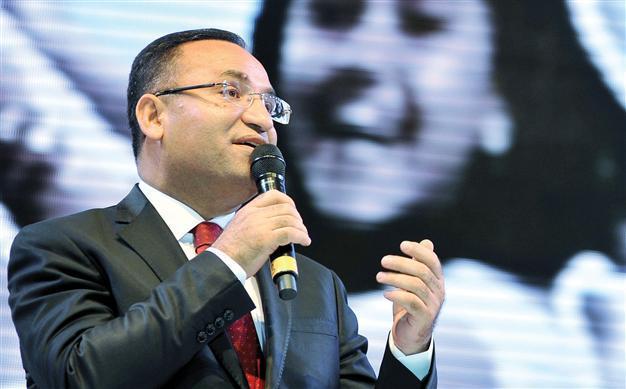Turkish government firm on curbing special courts’ power
ANKARA - Hürriyet Daily News

The third judicial package is expected to be submitted to Parliament within days, says Deputy PM Bozdağ. AA photo
The government won’t take a step back from its determinacy in curbing the broad authorities of the special-authority courts despite growing criticisms that this move will weaken the legal struggle against coup plotters and organized crime gangs as the draft law is expected to be submitted to Parliament this week.“Special-authority courts should function within the legal boundaries drawn by the law,” Deputy Prime Minister Bekir Bozdağ said in an interview with private Channel 7 yesterday. “While taking steps against military and civilian tutelage, against gangs, mafia and other power groups in the name of relieving Turkey, we cannot tolerate new groups [establishing] own tutelage,” Bozdağ said.
Bozdağ said the third judiciary reform package, which includes amendments to Article 250 of the Code of Criminal Procedure (CMK) regulating the special-authority courts, is expected to be submitted to Parliament within days after the approval of Prime Minister Recep Tayyip Erdoğan. The final version of the draft law will be discussed in Cabinet and the ruling party’s central decision-making body’s meeting today.
The special-authority courts have always been controversial since their establishment in 2005. The opposition parties have strongly criticized the government over these courts, accusing it of using these courts as tools for its revanchist moves.
Nationalist Movement Party (MHP) leader Devlet Bahçeli said they have first to see the draft law before adopting a position on the issue. “What we see in the media are the contradicting statements of some ministers. We will publicize our opinions on the issue at Parliament.”
Republican People’s Party (CHP) leader Kemal Kılıçdaroğlu, however, welcomed the move, though belatedly, saying special-authority courts had no place under democratic rule. “We are, in principle, against of such courts. Mr. Prime Minister is trying to amend the law at a breakneck speed because these courts attacked Hakan Fidan [chief of the National Intelligence Organization]. Why not show same sensitivity to other people who have been behind bars for years without even knowing on what charges they have been arrested?” asked Kılıçdaroğlu yesterday, speaking to TRT.
The Peace and Democracy Party (BDP) is also strongly against these courts as many of its officials have been either arrested or prosecuted by these courts in the Kurdistan Communities Union (KCK) case.
For Parliamentary Speaker Cemil Çiçek, however, abolishment of these courts and correcting some wrongdoings attributed to these courts are two different things. Targeting judges and prosecutors in Istanbul and cases carried out by them, Çiçek hinted that the discussion was sparked because of the actions of Istanbul-based courts. “These courts are necessary but its implementation should be reviewed,” he said and urged the government to keep away from “reactionary steps.”
Real opposition
However, the real opposition to the government’s plan to curb the broad authorities of these courts comes from the Gülen movement, a religious movement led by Fethullah Gülen, who resides in the United States. Newspapers belonging to this group claim this amendment will weaken the ongoing fight against plotters, which would cause the release of a number of people accused in the coup plot cases.
Bozdağ replied to the criticisms saying there would be no change in the government’s commitment to fighting against plotters, mafia or other unlawful actions even after the amendment of Article 250.
“This amendment will not change the nature of these sorts of crimes known as ‘coup crimes’,” he said. “If there is a crime, a reason for arrest, then the courts will continue to move accordingly even after these amendments [to Article 250].”
He also challenged the impression that the fight against coup plotters could only be possible thanks to these courts. “The same courts and prosecutors existed in the past,” he said, asking “Why didn’t these judges and prosecutors stand against the Feb. 28 process instead of applauding the plotting generals at the military headquarters?” Without the AKP, no prosecutor would have dared launch probes like Ergenekon or Balyoz, Bozdağ added. “This courage has been introduced to Turkey thanks only to the steps taken by the AKP.”
















